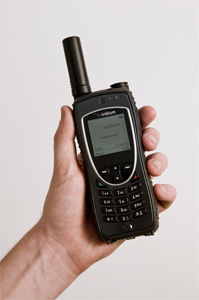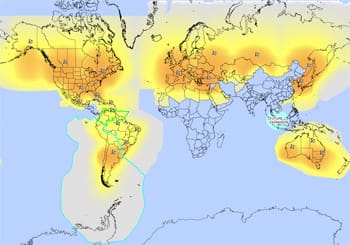More and more voyagers have satphones aboard their vessels, not just for emergencies, but for staying in touch. Whether you only want to make an occasional phone call, collect and send daily e-mails and download weather information, or want full Internet access, there are now options available that give you any or all of these capabilities anywhere in the world.
For the cruising sailor, the three biggest service providers of satellite communications are Inmarsat, Iridium and Globalstar. Each has its own advantages and disadvantages.
All three of the big providers, Inmarsat, Iridium, and Globalstar, have a host of equipment and plans. Globalstar (also SPOT Global phone) has only post-paid options, but Inmarsat and Iridium both provide pre-paid and post-paid options. With the pre-paid option, a fixed number of minutes which expire after a certain time, are purchased in advance. In most cases, a SIM card is physically mailed to you, so the pre-paid option requires some advance planning, especially if you are outside the U.S. For the post-paid option, you get a bill each month with the amount owed based on the plan you selected and your usage. Once you have the necessary SIM card, renewals and payments can be handled online. The post-paid option is usually less expensive, but the downsides are that you must commit to some period of time and there is no upper cap on extra minutes used each month. So what are your choices and do they make sense for you? To begin with, lets look at the three typical uses of a satphone aboard a voyaging boat: emergency use only, casual usage, and Internet access.
Emergency use only
If you only want a satphone aboard in the event of an emergency, you will need the basic equipment and the least expensive activation plan for your cruising area. Some voyagers choose to activate the satphone only for the duration of a passage, while others choose to purchase a long-term plan.
Casual usage
I loosely define a casual user as someone who, in addition to emergencies, uses the satphone for an occasional voice call as well as to send and receive short e-mails and pick up daily weather information. The casual user will need the basic equipment, a connection to an onboard computer or laptop, the associated software and an external antenna. The accompanying table compares the options available for a typical casual user: 10 minutes/month in voice calls, five text e-mails/day incoming, five text e-mails/day outgoing (at an average of 5 KB each), plus one 16 KB GRIB weather file each day.
 |
|
Courtesy Iridium The Iridium Extreme satphone. |
Internet access
Internet access by satphone is certainly available, but not cheap. Most of the plans include a certain number of megabytes (MB) of data transfer, then charge a fairly stiff rate for overages. The connections will be slow, ranging from 9.6 Kbps to 34 Kbps. It’s very easy to get an unpleasant surprise in the monthly bill if you aren’t careful. That automatic 200 MB Windows 8 update could cost you $1,400, and take all night to download!
If the goal is to have full Internet access with the capability of sending photos, large attachments, and an occasional YouTube download, as well as moderate phone usage, expect to pay a hefty amount for the necessary equipment plus several thousand dollars a month. For example, one of the Inmarsat plans which includes 750 MB of data and 200 minutes of voice calls is $3,149/month. While 750 MB of data seems like a lot, we typically use 5 GB of data a month when connected to a cable DSL network ashore.
Ways to save money
There are a number of ways to save money. Most of the equipment is available from several sources, and it pays to shop around. For example the cost of a new Iridium model 9555 satphone varies in price online from $998 to $1,495. You can also find them available used or refurbished. Check Amazon, Craigslist, eBay and any local cruisers’ swap meets.
When you sign up for a service, you will quite likely be dealing with a third party retailer. These retailers buy blocks of time from one of the three providers, Inmarsat, Iridium or Globalstar, and resell to you. The plans offered by the retailers vary considerably, so check around before making a commitment.
There are also a number of companies that specialize in providing data and voice packages. They often bundle all the equipment you need into the package, including an external antenna, cables, any connectors you might need and data compression software. These packages often save you money and certainly save headaches trying to gather together all the helpful accessories.
If you will be cruising a particular region, check for regional plans. Some of the providers have discounted plans for Australia/New Zealand or Latin America, for example.
If you are a member of the Seven Seas Cruising Association (SSCA, www.ssca.org), there are several companies that offer discounts for satphones and packages. Members can visit the “Special Offers” webpage of the SSCA website for information. If you are not a member, the money saved may more than offset the membership fee.
Finally, there will probably be a number of changes in 2014. All three providers are launching new satellites, and Iridium and Inmarsat both have plans for high-speed broadband type communications in the near future.
Caveats
Whether you decide on a pre-paid or post-paid plan, you will be entering into a contract with the retailer. You will, at the least, be required to pay the activation fee (usually $50), and you may, in the case of a post-paid plan, have a long-term commitment to the retailer. Thus, it pays to do your homework on the retailer. Check online reviews and the nautical forums, and check with any friends who are using satphones to find a retailer that is reputable and provides after-sale service.
Be sure to read the contract carefully to avoid any unpleasant surprises. For example, some retailers charge a higher amount for minutes if you don’t make your connection through the retailer’s data portal.
Another example is the activation date of pre-paid plans. If you purchase minutes with a pre-paid plan, you begin by buying a SIM card that is usually loaded with a certain number of minutes. The minutes will expire after a predetermined amount of time once the card is activated. Some retailers activate the card on the day it is shipped, while others allow you to select a date in the future that the card will be activated. Once the minutes run out or the activation time expires, you may be required to buy another SIM card or you may be able to buy more minutes online. Depending on your passage plans, these issues may or may not make a difference to you, but it is good to be aware of them before you pay the activation fee.
The following is a short list of retailers. These companies all sell or rent satphone equipment, as well as sell airtime. It’s a good starting point for your own research.
OCENS Satellite Systems and Service (www.ocens.com)
Global Marine Networks (www.globalmarinenet.com)
Outfitter Satellite Phones (www.outfittersatellite.com)
————-
David Lynn and Marcie Connelly-Lynn have lived aboard Nine of Cups, their Liberty 458 cutter since 2000. Find them at www.nineofcups.com.

